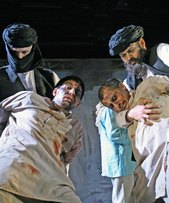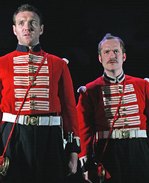SITE GUIDE
SEARCH
REVIEWS
REVIEW ARCHIVES
ADVERTISING AT CURTAINUP
FEATURES
NEWS
Etcetera and
Short Term Listings
LISTINGS
Broadway
Off-Broadway
NYC Restaurants
BOOKS and CDs
OTHER PLACES
Berkshires
London
California
New Jersey
DC
Connecticut
Philadelphia
Elsewhere
QUOTES
TKTS
PLAYWRIGHTS' ALBUMS
LETTERS TO EDITOR
FILM
LINKS
MISCELLANEOUS
Free Updates
Masthead
A CurtainUp Review
The Great Game: Afghanistan
|
Does it not feel as if you are fighting the wind?—an Afghan despot's question to a British soldier in Stephen Jeffreys' Bugles at the Gates of Jalalabad.
|

Cast in The Lion of Kabul (Photo: John Haynes) |
This dramatic smorgasbord makes for a lengthy meal with much to chew on and digest. The sprawling amalgam of plays has been divided into three installments: Part One 1842-1930: Invasions and Independence, PartTwo 1979-1996: Communism, The Mujahideen & The Taliban, and Part Three 1996-2010: Enduring Freedom. This allows you to see any or all parts in any order and over 3 evenings, or as a day-long marathon event. I as well as my Curtainup colleagues chose the all-in-one approach which probably makes for the most powerful experience.
The cyclical story traces the invasion and resistance pattern interwoven into the political and cultural fabric of the country since 1842. A dozen British and American playwrights were enlisted by the London-based, always politically-minded Tricycle Theatre. The Playwrights were invited to address the geopolitical quagmire in Afghanistan. And so they have.
"The Great Game" historically refers to the strategic rivalry and conflict between the British Empire and the Russian Empire for supremacy in Central Asia. The term was introduced into the popular culture by British writer Rudyard Kipling in his 1901 novel Kim. In light of this dramatic assemblage, the definition can be broadened to embrace both its historic meaning and its pertinence to the political tensions in Afghanistan today.
The purpose and content of the entire trilogy serves as an illustration that the progressive gains in Afghanistan have been few. First ruled by a number of fiercely independent warlords, the land has become a patch of ground for foreigners to graft their own political vision upon. One watches this unfold through the British and Soviet skirmishes during the first section, then branch out to bring in Communism, the Taliban and the ostensible Western support in the last two parts. The dominating purpose and content of the entire trilogy serves to illustrate that the progressive gains in Afghanistan have been few. Indeed playwright Simon Stephens in his Canopy of Stars sadly hits the nail on the head when he writes that Afghanistan is "the new North Ireland."

Tom McKay and Rick Warden in Bugles at the Gates of Jalalabad by Stephen Jeffreys.
{Photo by John Haynes) |
The best piece by far is David Edgar's Black Tulips,which is dramatically structured as military briefings running from 1981 through 1987. As its five scenes unfold one learns the harsh tradition of vendetta in the tribal lands and how this brutally corresponds to the old Afghan story of how a man answers the question "Have you an enemy?" with "Of course, I have a cousin."
The scope of this multi-play enterprise demands admiration. However, some of the pieces are too sketchy and need fleshing out while others would benefit from tightening up the dialogue. Still, the cumulative effect is powerful, an opportunity to experience cutting-edge political drama. The Verbatim policy presentations by actors portraying the likes of Hillary Clinton and military operatives like General Stanley McCrhystal that are sparingly peppered into the work add authentic flavor and gravitas to the proceedings.
The ensemble has a tall order to fill here. While all the actors are required to play multiple roles, not all are up to the formidable task. There are standout performances from Jemma Redgrave (Yes, she's the daughter of the late-Corin, and niece of Vanessa Redgrave), Shereen Martineau, and Tom McKay. The rest of the cast is serviceable but lack the versatility to play the range of global characters.
Don't expect this investment in time to leave you with a clear picture of who's on the wrong or right side of history or provide answers to how to get to the the bottom and out of the political and social morass. The real purpose of this ambitious triptych is to spark a fresh public debate on this troubled land. Perhaps Winston Churchill anticipated the spirit of this event when he said: "To jaw-jaw is always better than to war-war."
For more details about the individual plays, see Curtainup's previous reviews The Great Game-London, which had the plays somewhat differently arranged ( probably because one of the playwrights from that staging withdrew his piece and one by h Lee Blessing in its place during the US tour). . . The Great Game-DC.
| The Great Game: Afghanistan Directed by Nicholas Kent and Indhu Rubasingham Playwrights Part One— 1842-1930, Invasion & Independence: Monologue by Siba Shakib, Bugles at the Gates of Jalalabad, by Stephen Jeffreys; Duologue by Siba Shakib; Durand's Line, by Ron Hutchinson; Verbatim, edited by Richard Norton-Taylor; Campaign by Amit Gupta; Now is the Time, by Joy Wilkinson. Playwrights Part Two—1979-1996: Communism, Mujahideen & the Taliban. Black Tulips, by David Edgar; Monologue by Siba Shakib; Wood for the Fire, by Lee Blessing; Miniskirts of Kabul, by David Greig; Duologue by Siba Shakib; The Lion of Kabul, by Colin Teevan. Playwrights Part Three — 1996-2010: Enduring Freedom. Honey, by Ben Ockrent; The Night is Darkest Before the Dawn, by Abi Morgan; Verbatim, edited by Richard Norton-Taylor; On the Side of the Angels, by Richard Bean; Verbatim, edited by Richard Norton-Taylor; Canopy of Stars, by Simon Stephens. Cast: Daniel Betts, Sheena Bhattessa, Michael Cochrane, Karl Davies, Vincent Ebrahim, Nabil Elouahabi, Shereen Martineau, Tom McKay, Daniel Rabin, Danny Rahim, Raad Rawi, Jemma Redgrave, Cloudia Swann, Rick Warden. Project Designer: Pamela Howard Original Lighting Designer: James Farncomber Sound Designer: Tom Lishman At NYU's Skirball Center, 566 La Guardia Place (at Washington Square) 212/352-3101 Single tickets are $70; tickets for three plays are $135. : From 12/01/10; opening 12/07/10; closing 12/19/10. Wednesday, Thursday, & Friday @ 7:30pm; trilogy days presenting the three plays are on Saturday & Sunday on the following dates: 12/04, 12/05, 12/11, 12/12, 12/18, 12/19 @ 11:30am (Part One); 3pm (Part Two); 7:30pm (Part Three). Running time: approximately 2 hours and 30 minutes for each of the three parts. Reviewed by Deirdre Donovan on December 4th during the tour's stop at the NYU's Skirball Center. |
|
REVIEW FEEDBACK Highlight one of the responses below and click "copy" or"CTRL+C"
Paste the highlighted text into the subject line (CTRL+ V): Feel free to add detailed comments in the body of the email. . .also the names and emails of any friends to whom you'd like us to forward a copy of this review. Visit Curtainup's Blog Annex For a feed to reviews and features as they are posted add http://curtainupnewlinks.blogspot.com to your reader Curtainup at Facebook . . . Curtainup at Twitter Subscribe to our FREE email updates: E-mail: esommer@curtainup.comesommer@curtainup.com put SUBSCRIBE CURTAINUP EMAIL UPDATE in the subject line and your full name and email address in the body of the message. If you can spare a minute, tell us how you came to CurtainUp and from what part of the country. |

Slings & Arrows-the complete set
You don't have to be a Shakespeare aficionado to love all 21 episodes of this hilarious and moving Canadian TV series about a fictional Shakespeare Company






